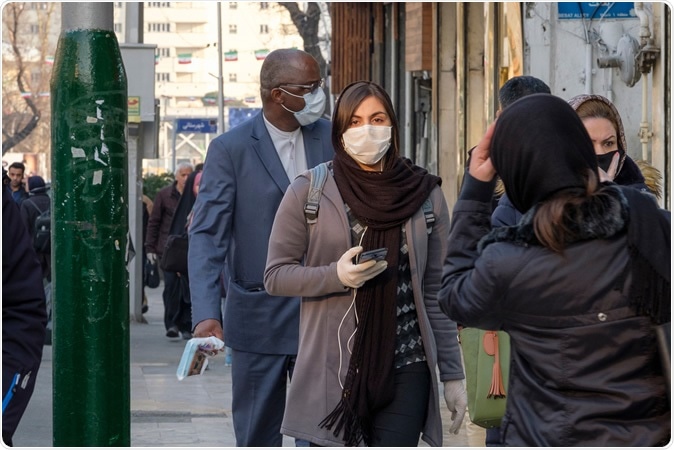Iran has the third-highest number of coronavirus disease (COVID-19), deaths after China and Italy, the highest in Western Asia, and the fourth-highest number of SARS-CoV-2 cases, surpassed by only Mainland China, South Korea, and Italy. The country reported its first COVID-19 case on February 20.

Tehran / Iran - Mar 5 2020: Image Credit: Farzad Frames / Shutterstock
Now, the government has imposed measures in the hopes of containing the virus since the sudden rise in confirmed cases and deaths.
Iran now has a staggering 3,513 confirmed cases of COVID-19, while 107 of these patients have died. The rapid increase in cases is of concern since the country has long coped with a weak healthcare system. In line with the government’s efforts to contain the spread of the virus in crowded jails, it has temporarily freed 54,000 prisoners.
Iran’s judiciary spokesman Gholamhossein Esmaili told reporters the inmates were permitted to go out of prison after testing negative for COVID-19 and posting bail. The health ministry will oversee the prisoner release, but it was unclear how the government will keep track of them.
It is still unknown whether Nazanin Zaghair-Ratcliffe, the British-Iranian mother jailed in Iran for espionage charges, will be included in those who were released.
The country is now limiting travel between its major cities and has shut schools until April. Health Minister Saeed Namaki said people should not use the break as an opportunity to travel. He also urged Iranians to reduce their use of paper banknotes.
Struggle to control the flow of people
The city of Qom, has been the epicenter of the virus outbreak in the country. Since the spread of the virus in Qom and neighboring regions, the virus has reached around a dozen other countries, including Afghanistan, Pakistan, and Iraq.
As Iran grapples with the outbreak its neighbors have been battling to stem the tide of both people and food across their borders from Iran.
The countries near Iran fear that if the travel of people won’t be limited or stopped temporarily, the spread of the virus will be inevitable. Since February 25, many countries in the Middle East have closed their air and land borders to Iran as the deadly coronavirus continues to spread, including Turkey, Iraq, Afghanistan, Armenia, and Pakistan, among others.
Other regional countries such as Kuwait, Jordan, Saudi Arabia, the UAE, Georgia, and Oman have imposed travel and immigration restrictions.
The current crisis is posing a serious threat to Iran’s economy. The country is struggling with how to sustain the economy despite the vast spread of the virus.
On March 3, the health ministry said that the number of confirmed cases had increased by more than 50 percent for two consecutive days. As of writing, Iran reports 3,513 confirmed cases of the virus. The death toll has reached 107, although the real figure is thought to be far higher.
Iranian government officials have also contracted the virus, including the country’s deputy health minister, who oversees the anti-coronavirus task force. The country’s vice president is also fighting the infection.
Neighboring countries have reported confirmed cases linked to recent travel to Iran. The country has been deemed as a coronavirus threat since a growing number of doctors and analysts have questioned the death toll tallies, with own members of the parliament accusing the government of covering up the extent of the outbreak in the country.
Public gatherings, including Friday prayers in Tehran and other cities, have been suspended. The country has also started closing schools while cleaners were instructed to disinfect buses, trains, and public places.
Ongoing U.S. sanctions
The ongoing U.S. sanctions, which have been imposed by President Trump in 2018, have worsened the situation. The country was unprepared for the return of the sanctions, with its economy thriving to cope with the coronavirus outbreak.
With supplies running out and increasing consumer prices, residents find it hard to make ends meet. With a weakened economy and struggling government, the country is now striving to survive the worst outbreak it has experienced. Though Tehran has received assistance from China and the WHO to battle the coronavirus, the country still faces a huge predicament in stemming the rapid spread of COVID-19.
The U.S. sanctions, a pummeled economy, and isolation from other countries may have contributed to the country’s mismanagement of the health crisis.